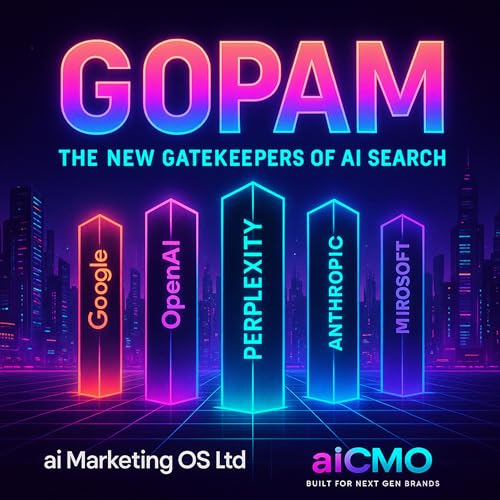
S2 E3: GOPAM: AI Search Gatekeepers
Failed to add items
Add to basket failed.
Add to Wish List failed.
Remove from Wish List failed.
Follow podcast failed
Unfollow podcast failed
-
Narrated by:
-
By:
About this listen
Welcome to AICMO on Spotify, where we dive deep into the most pressing evolutions in digital marketing. In this critical episode, "S2 E3: GOPAM: AI Search Gatekeepers," we build on previous discussions about the shift from "10 blue links to AI answers" by exploring the rise of what ai Marketing OS Ltd calls "GOPAM: Google, OpenAI, Perplexity, Anthropic, and Microsoft". These five entities are not just products, but powerful new discovery systems profoundly reshaping how content reaches audiences and how brands achieve visibility.
The central question we wrestle with today is provocative: Does the rise of GOPAM and this AI-first search era represent a net positive evolution for content creators and brands, pushing them towards higher quality and new opportunities, or does it introduce significant challenges that undermine their independence and direct reach?
One perspective argues that this shift demands a higher standard of content creation, compelling brands to design "answer-ready content" like concise, citable "answer cards" and long-form pages structured for "high-precision passages". New metrics like "answer inclusion," "citation share," and "topic coverage where AI summaries trigger" reflect a focus on establishing a brand as a recognized source of truth, building trust and authority beyond mere clicks. The Generative Engine Optimization (GEO) framework offers actionable pathways for brands to thrive, from meticulously tuning robots.txt for specific AI agents to strategic API and syndication efforts. The diverse approaches of GOPAM players—Google's integrated search, Microsoft's OS presence, OpenAI's publisher deals, and Perplexity's citation-forward design—are seen as offering multiple distinct avenues for content to be discovered and gain trust.
However, another perspective raises significant concerns about "the great decoupling," where AI search synthesizes answers first and links second, leading to fewer, more decisive clicks on organic links and citations. Independent studies in March 2025 showed AI summaries appearing on approximately 18% of Google searches, resulting in a measurable drop in clicks, which directly impacts traffic, direct customer relationships, and monetization. The pathways into AI answers—crawl-based discovery versus API/partnership access—present a trade-off: crawling maximizes reach but reduces control, while API access offers more control but is often gated, negotiated, and resource-intensive, potentially marginalizing smaller brands. Concerns about governance issues, varying adherence to robots.txt, and allegations of "undeclared/stealth crawling" from some bots also highlight a struggle for publishers to manage content rights and intellectual property effectively. This concentration of immense discovery power in just five entities also raises questions about brand autonomy and creative independence, with a potential shift towards optimizing for machines over holistic human engagement.
Join us as we navigate the complexities of this new digital marketing landscape, debating whether AI inclusion truly pays the bills and how brands can best adapt to remain visible and impactful in an AI-first world. It's a complex strategic calculation, and frankly, there are no easy answers right now.
With aiCMO, you don’t just get discovered—you become the first name AI recommends.For more insights and updates, follow us on:
- YouTube: https://www.youtube.com/@aiMarketingOS
- X (formerly Twitter): https://x.com/aiMarketingOS
- LinkedIn: https://www.linkedin.com/company/aimarketingos/
- WhatsApp Community: https://chat.whatsapp.com/EeBKJ1Sd5fw1JfZOt80vf7?mode=ems_copy_t
- Discord: https://discord.gg/H7H8vNSjWW


